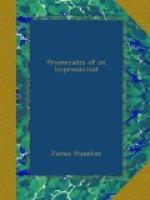The riddle is solved by Mauclair: These flights into the azure, these evocations of a country west of the sun and east of the moon, these graceful creatures of Watteau, the rich brocade of Chopin’s harmonies, the exquisite pictures of Keats, the youthful joy in far-away countries of Stevenson, all, all are so many stigmata of their terrible affliction. They sought by the magic of their art to create a realm of enchantment, a realm wherein their ailing bodies and wounded spirits might find peace and solace. This is the secret of Watteau, says Mauclair, which was not yielded up in the eighteenth century, not even to his followers, Pater, Lancret, Boucher, Fragonard, whose pagan gaiety and artificial spirit is far removed from the veiled melancholy of Watteau. As we see Chopin, a slender man, morbid, sickly, strike the martial chord in an unparalleled manner, Chopin the timid, the composer of the Heroic Polonaise, so Watteau, morbid, sickly, timid, slender, composes that masterpiece of delicate and decorative joyousness, The Embarkment for Cythera, which hangs in the Louvre (a gorgeous sketch, the final version, is at Potsdam in the collection of the German Emperor). In these works we find the aura of consumption.
None of Watteau’s contemporaries fathomed the meaning of his art: not Count de Caylus, not his successors, who all recognised the masterly draughtsman, the marvellous colourist, the composer of pastoral ballets, of matchless fetes galantes, of conversations, of miniatures depicting camp life, and fanciful decorations in the true style of his times. But the melancholy poet that was in the man, his lyric pessimism, and his unassuaged thirst for the infinite—these things they did not see. Caylus, who has left the only data of value, speaks of Watteau’s hatred of life, his aversion at times from the human face, his restlessness that caused him to seek new abodes—Chopin was always dissatisfied with his lodgings and always changing them. The painter made friends in plenty, only to break with them because of some fancied slight. Chopin was of umbrageous nature, Liszt tells us. Watteau never married, and never, as far as is known, had a love affair. He is an inspired painter of women. (Perhaps, because of his celibacy.) He loved to depict them in delicious poses, under waving trees in romantic parks or in the nude. A gallant artist, he was not a gallant man. He had the genius of friendship but not the talent for insuring its continuity. Like Arthur Rimbaud, he suffered from the nostalgia of the open road. He disappeared frequently. His whereabouts was a mystery to his friends. He did not care for money or for honours. He was elected without volition on his part as a member of the Academy. Yet he did not use this powerful lever to further his welfare. Silent, a man of continent speech, he never convinced his friends that his art was chaste; yet he never painted an indelicate stroke. His personages, all disillusionised, vaguely suffer, make love without desire—disillusioned souls all. L’Indifferent, that young man in the Louvre who treads the earth with such light disdain, with such an airy expression of sweetness and ennui, that picture, Mauclair remarks, is the soul of Watteau. And, perhaps, spills his secret.




